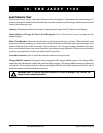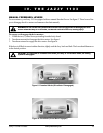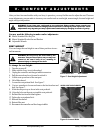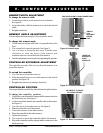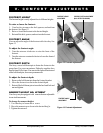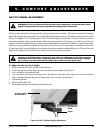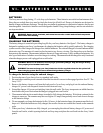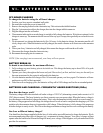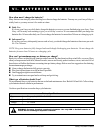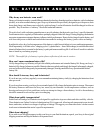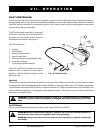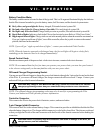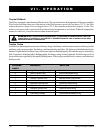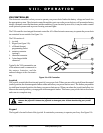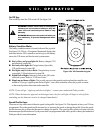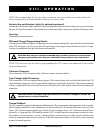
26 www.pridemobility.com Jazzy 1103 Rev L/Feb03
VI. BATTERIES AND CHARGING
How often must I charge the batteries?
Many factors come into play when deciding how often to charge the batteries. You may use your Jazzy all day on
a daily basis or you may not use it for weeks at a time.
n Daily Use
If you use your Jazzy on a daily basis, charge the batteries as soon as you are finished using your Jazzy. Your
Jazzy will be ready each morning to give you a full days service. It is recommended that you charge the
batteries 8 to 14 hours after daily use. Do not charge the batteries for more than 24 hours at a charging cycle.
n Infrequent Use
If you use your Jazzy infrequently (once a week or less), you should charge the batteries at least once per week
for 12 to 14 hours.
NOTE: Keep your batteries fully charged and avoid deeply discharging your batteries. Do not charge the
batteries for more than 24 hours at a charging cycle.
How can I get maximum range or distance per charge?
Rarely do you have an ideal driving situation such as smooth, flat, hard terrain with no wind, hills, or curves. More
often you are presented with hills, sidewalk cracks, uneven and loosely packed surfaces, curves, and wind. All of
these factors will affect the distance or running time per battery charge. Below are a few suggestions for obtaining
the maximum range per charge:
n Always charge the batteries fully prior to your trip.
n Plan your trip in advance to avoid inclines if possible.
n Limit baggage weight to essential items.
n Try to maintain an even speed and avoid stop-and-go driving.
What type of batteries should I use?
We recommend deep-cycle batteries that are sealed and maintenance free. Both AGM and Gel-Cell are deep-
cycle batteries that are similar in performance.
Use these specifications to reorder deep-cycle batteries:
Battery Specifications
Type: Deep-cycle (AGM or Gel-Cell)
Size: U-1
Voltage: 12 V each
WARNING! Corrosive chemicals contained in batteries. Use only AGM or Gel-Cell batteries to
reduce the risk of leakage or explosive conditions.



